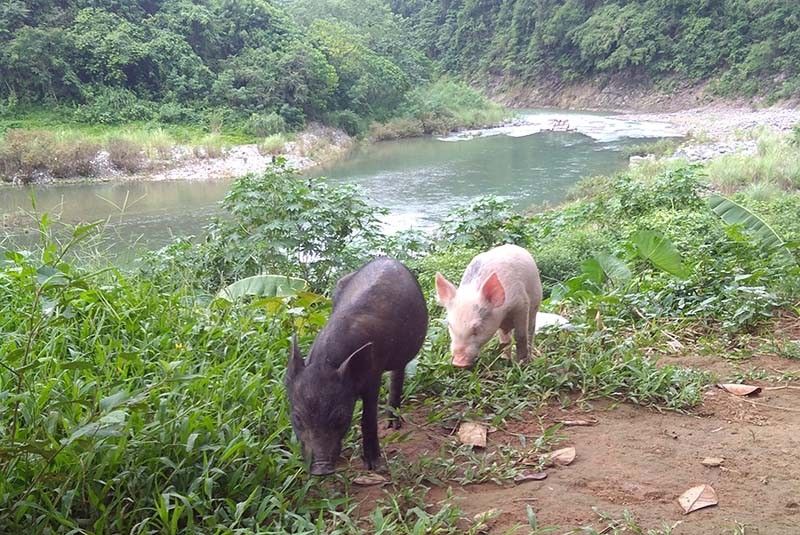36,000 hogs lost to African swine fever as more areas affected

MANILA, Philippines — The Philippines is nowhere near containment of African swine fever as hog deaths have nearly doubled to 36,000 and with more areas getting affected.
In its latest bulletin, the Department of Agriculture Crisis Management Task Force said about 12,000 head of swine tested positive for ASF in more than 20 barangays in Rizal, Bulacan, Pampanga and Quezon City.
"This represents one-third of the total depopulated pigs in ground zero," ASF Task Force head Reildrin Morales said.
This means that the remaining two-thirds of the pigs or 24,000 were culled due to the 1-7-10 protocol of the DA.
The 36,000 affected hogs is 0.28% of the country’s total hog population of 12.8 million hogs.
'1-7-10' protocol
Under the 1-7-10 protocol, bringing hogs in and out of the one-kilometer radius of the site of infection or ground zero is prohibited. The area will also eventually be depopulated.
Within the seven-kilometer radius, hogs will be under surveillance with restricted movements while blood testing will be undertaken. For the 10-kilometer radius, a mandatory monitoring and reporting of swine disease occurrences shall be implemented.
Just last week, the DA said only 20,000 pigs have died or have been culled due to the ASF.
The DA also confirmed new cases of ASF in two new areas in Quezon City—Tandang Sora and Commonwealth.
The other confirmed areas are the barangays in San Isidro, San Jose, Macabud, Geronimo, San Rafael, and Mascap in Rodriguez; San Mateo in Rizal; Barangay Cupang and another unidentified area in Antipolo, Barangay Pritil in Guiguinto, Bulacan, Barangay Bagong Silangan, Payatas, Tatalon, and Pasong Tamo in Quezon City, Mapandan in Pangasinan and two areas in Pampanga.
Cordillera is ASF-free
Further, the DA-Cordillera has assured the public that the region is free from ASF.
Results from the laboratory of the Bureau of Animal Industry also confirmed that samples were taken from the pigs that were dumped in Loakan, Itogon in Benguet last September 24 tested negative from ASF.
Data showed that Cordillera’s swine population is about 260,000 heads and most are backyard farming.
Regional ASF Focal Person Karl Kigis said that DA is doing its best effort and measures in the prevention and control of animal pests and disease outbreak especially the no entry of ASF in the region.
"Preparedness or improved early warning detection, and coordination needs to be in place and reviewed properly in relation to cases of ASF from other regions," he added.
BAI-National Veterinary Quarantine Services veterinarian Delfina Layagan noted that the operation of quarantine checkpoints is continuous to ensure that no product carrier of ASF coming from neighboring places will enter the region.
She said DA-CAR has requested the national office for additional personnel to be deployed in the different quarantine checkpoint areas of the region. A total of thirteen quarantine checkpoints were positioned in different provinces.
Local governments commended
Meanwhile, the DA commended local government officials and swine industry leaders for their swift and decisive action, and sustained strong cooperation in the continued efforts to manage, control and contain ASF.
Agriculture Secretary William Dar said foremost of their efforts were the strict implementation of the 1-7-10 protocol on ASF-affected barangays, and the 24-7 animal quarantine checkpoints to prevent the spread of the disease in other adjoining areas.
"Despite the mounting challenges, they are deftly managing, controlling and containing ASF in their respective localities, in strong partnership with commercial hog industry partners, the PNP and the military," Dar said.
"Our commitment to protect the health and safety of pork-consuming public and the P260-billion swine industry — in partnership with the LGUs, PNP, military and other government agencies and the private sector — is stronger than ever," he added.
Starting last week, DA has deployed 100 additional staff to support laboratory operations, and airport and checkpoint inspections, as part its elevated response in ASF- affected areas.
"We call on for continued vigilance and cooperation of the industry and the general public to prevent this disease from further spreading. What’s on the line is the future of the swine industry, where 65 percent is shared by small backyard raisers," Dar said.
He also appealed to traders not to buy ASF-affected hogs, and likewise backyard raisers not to sell ASF-sick pigs, as such malpractices are punishable by law.
While the disease is not transferrable to humans and other animals, ASF fatally infects a swine herd. The disease has no known vaccine yet.
- Latest
- Trending































